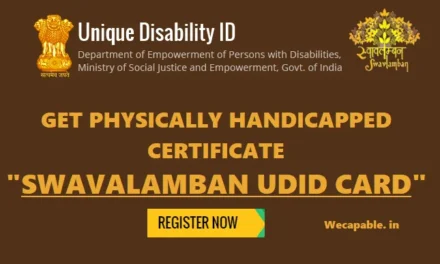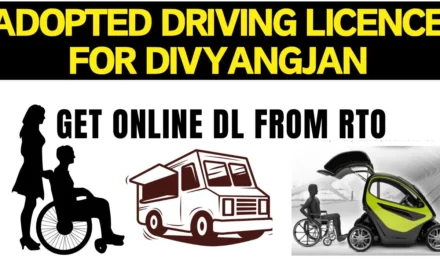Persons with Disability is a term used to describe a wide range of physical, mental, and emotional impairments that can limit a person’s ability to participate in everyday activities. It is important to understand the different types of disabilities and how they can affect people’s lives.
Disabilities or Physical disabilities are impairments that limit a person’s ability to move or use their body. These can include conditions such as cerebral palsy, muscular dystrophy, and spinal cord injuries. People with physical disabilities may need to use assistive devices such as wheelchairs, walkers, or canes to help them move around.
Mental disabilities are impairments that affect a person’s ability to think, learn, and remember. These can include conditions such as autism, Down syndrome, and intellectual disabilities. People with mental disabilities may need help with everyday tasks such as shopping, cooking, and managing money.
Emotional disabilities are impairments that affect a person’s ability to regulate their emotions. These can include conditions such as depression, anxiety, and post-traumatic stress disorder. People with emotional disabilities may need help managing their emotions and may benefit from counseling or therapy.
No matter what type of disability a person has, it can have a significant impact on their life. People with disabilities may need to make adjustments to their daily routines or use assistive devices to help them participate in activities. They may also need to rely on family, friends, or professionals for support. It is important to recognize the challenges that people with disabilities face and to provide them with the resources and support they need to live full and meaningful lives.
In different cultures and languages, a disability is addressed differently. Some of the common terms used for a person with disability are:
- Disabled Person
- Physically Challenged Person
- Handicapped Person
- Divyangjan (in India)
- Differently-abled Person
- Person with Special Needs
(used mostly for persons with mental, intellectual or developmental disabilities)
Special Person
In addition to the previous information, individuals with disabilities can also be identified using terminology that highlights their specific disabling conditions. Unfortunately, derogatory terms are frequently used when referring to people with disabilities.
Examining the Rights of Persons with Disabilities: What Are They Entitled To?
Disabilities are entitled to a range of rights that are enshrined in international law. These rights are designed to ensure that persons with disabilities are able to live with dignity and autonomy, and to participate fully in society.
The Convention on the Rights of Persons with Disabilities (CRPD) is the primary international instrument that sets out the rights of persons with disabilities. The CRPD was adopted by the United Nations in 2006 and has been ratified by over 170 countries. It is the first legally binding international instrument that focuses on the rights of persons with disabilities.
The CRPD outlines a range of rights that persons with disabilities are entitled to, including the right to:
• Equality and non-discrimination:
Persons with disabilities are entitled to equal rights and opportunities as other members of society. They should not be discriminated against on the basis of their disability.
• Respect for physical and mental integrity:
Persons with disabilities have the right to be free from torture, cruel, inhuman or degrading treatment or punishment.
• Accessibility:
Persons with disabilities have the right to access public spaces, services and information in an accessible manner.
• Education:
Persons with disabilities have the right to an inclusive education that is tailored to their individual needs.
• Employment:
Persons with disabilities have the right to work on an equal basis with others and to receive reasonable accommodations in the workplace.
• Participation in political and public life:
Persons with disabilities have the right to participate in political and public life on an equal basis with others.
• Freedom from exploitation, violence and abuse:
Persons with disabilities have the right to be free from exploitation, violence and abuse.
These are just some of the rights that persons with disabilities are entitled to under international law. It is important to remember that these rights are not just theoretical; they are real and must be respected and protected.
Exploring the Different State Laws and Regulations Regarding Persons with Disabilities
Persons with disabilities are protected by a variety of state laws and regulations. These laws and regulations are designed to ensure that persons with disabilities are treated fairly and have access to the same opportunities as those without disabilities.
In the United States, the Americans with Disabilities Act (ADA) is the primary federal law that protects the rights of persons with disabilities. The ADA prohibits discrimination against persons with disabilities in employment, public services, public accommodations, and telecommunications. The ADA also requires employers to provide reasonable accommodations for disabilities.
Many states, in addition to the ADA, have their own laws and regulations that safeguard the rights of individuals with disabilities. These laws differ across states but generally offer additional protections beyond what the ADA provides. For instance, some states mandate that employers offer reasonable accommodations for disabilities, even if the ADA does not require them.
Moreover, alongside laws protecting disability rights, many states have regulations governing the provision of services to individuals with disabilities. These regulations encompass aspects such as accessible buildings, transportation, communication, and workplace accommodations.
Lastly, states often have laws and regulations safeguarding the rights of individuals with disabilities within the criminal justice system. These laws may entail provisions for reasonable accommodations during court proceedings and protection against discrimination within the criminal justice system.
Overall, the laws and regulations pertaining to disability rights vary from state to state. It is crucial for individuals with disabilities to be aware of the laws and regulations in their respective states to ensure their rights are upheld.





